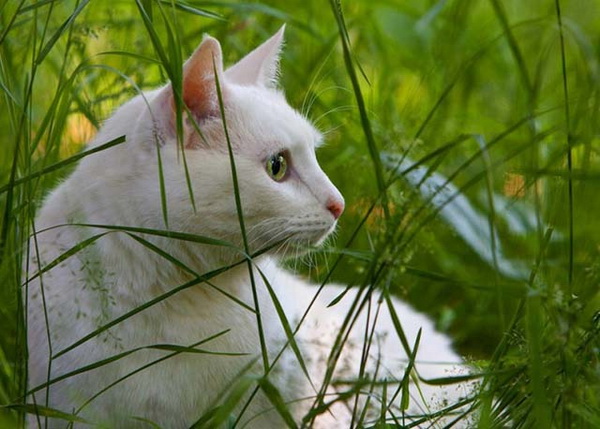26 JULY 2019 Y.
Cat is a favorite animal of the Muslims. You can often meet Keepers of mausoleums, mosques, and madrassas in Central Asia. In Islam, it is thought that there is no place for the evil spirit in a place where the cat lives, and for saving even one cat’s life a person gets a chance to go to Haven eventually. There is hadith called “Love for Cats is part of the Faith” which reflects Muslims’ attitude to this animal.
A lot of legends and believes as well as hadiths in Asia are connected with cats, especially the most famous one – about Muezza, the cat of Muhammad the Prophet which listened to all his preachers. Once it fell asleep on a hem (or sleeve) or his robe and not to disturb its sleep the Prophet cut part of his cloth off and left. Following the Prophets’ example, Muslims consider water from which a cat could drink suitable for ablution. The second wife of the Prophet, Aisha, ate food which was touched by a cat.
Almost all great scientists, poets and writers of the East in the Middle Ages had cats in honor of which they were writing odes and short stories. Cats were saving their precious books from rodents which were eager to eat paper from the rise. Cats are favorite heroes of Sufi’s parables.
Ibn Bashbad was once sitting with his friends on the roof of a mosque in Cairo. His friends were eating something. When a cat was passing by they gave it some food. It took the food and was coming back over and over. The scientists followed the can. They found out that it was running to the neighbouring house on the roof of which there was a blind cat sitting. This cat was leaving pieces of food taken from pundits to this blind cat. In this situation, Bashbad saw care for blind from the Allah and he was so astonished that he abandoned all his belongings and started to live in poverty completely relying on the Allah till his death in 1067 (verbal story was written at the end of 14th century by theologian and zoologist Damiri).

In Cairo, there is another interesting rarity – the Garden of Justice. In the 18th century, this garden was given to the town by sultan Mumluk al-Zahir Baybars with special condition that people of the town will be feeding cats which live there. Even today, despite the change of the owner of the place, this tradition remains unchanged – before the entrance, there are baskets with food.
A gorgeous red cat lives at the Museum of Ismoil Samani in Bukhara. It is one of the oldest buildings in town, tracery, and light – the cat entered through holes between brick patters and in the morning it met custodian on the threshold as if saying: “I came to settle here forever”. As if he was an owner and was not afraid of anything. Custodian of the mausoleum bring food to this self-declared Keeper every day and even brought a small pillow for it.
In memory of Muezza, Muslims consider white cats as holy ones and they are allowed to enter mosques. In Bukhara people do not pay much attention to the coloring – any cat walk where it wants and sleep in the mosque during Friday Prayer. For example, Friday Prayer at Bolo Khauz Mosque on the photo.
According to the legend, cats of Khiva thought to be good spirits. Arabs think that Qariina, “good spirit”, often takes shape either of cat or dog or another domestic animal. The belief that Qariina moves into cat’s body at night is so strong that no one ever thinks to offend or hurt a cat after darkness, there are a lot of stories of horrible consequences of similar actions.
By the way, if you enter UNESCO building in Tashkent, you will see several black cats with fetching collars with medallions. People say that some of them left along with UNESCO representatives to other countries and live with them now as a memory of Uzbekistan.
Sufis say that cat’s murmur is similar to zakr – monotone repetition of holy texts. Recently, the scientists made a discovery that frequencies on which cats murmur assist in bones and wounds healing. According to Muslim legend, lines on forehead of many cats are a memory of an occasion when a cat saved Abu Hureiyru (whose name is translated as Father of Cats) from a snake. It is thought that this is a trace of the prophet’s fingers and cats can always fall on their feet due to this.
There is a wonderful difference in perception – in the European tradition, if a black cat crosses the road, it is a symbol of misfortune and so that to avoid this “sequence of misfortune” people try to go before it, to outrun it or drive it with shouts. In Islam it is visa versa – without a doubt, the black cat is a powerful gin, and it is not worth crossing its way. You should just wait while the can finish its way, and then continue your way and it will be lucky and successful!














